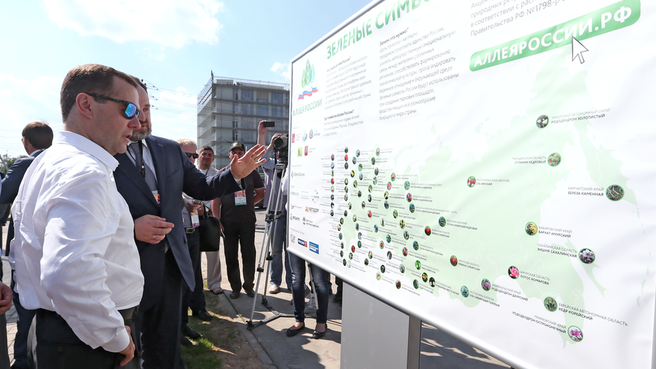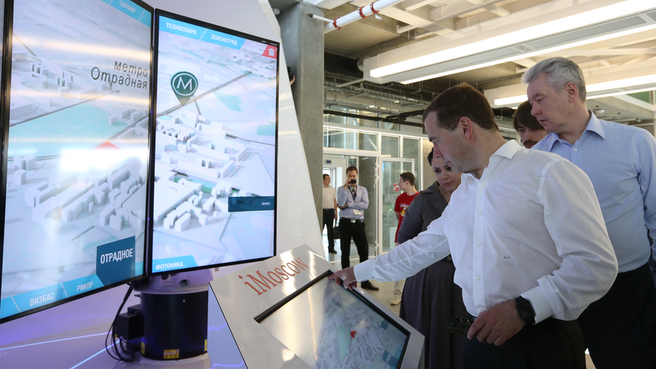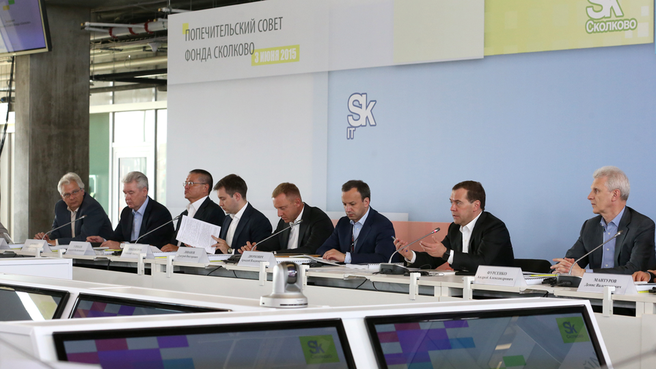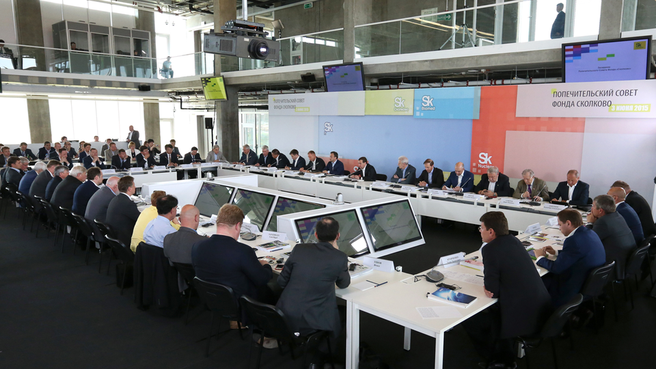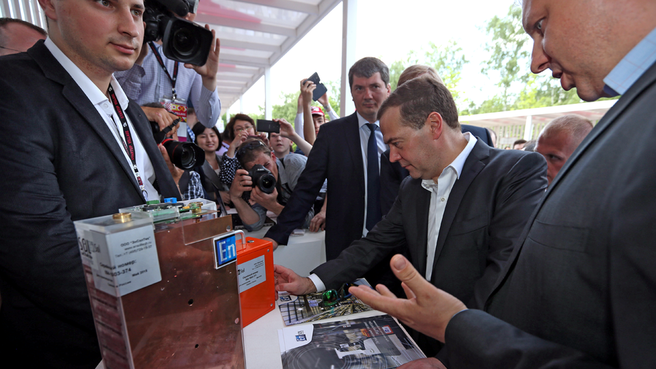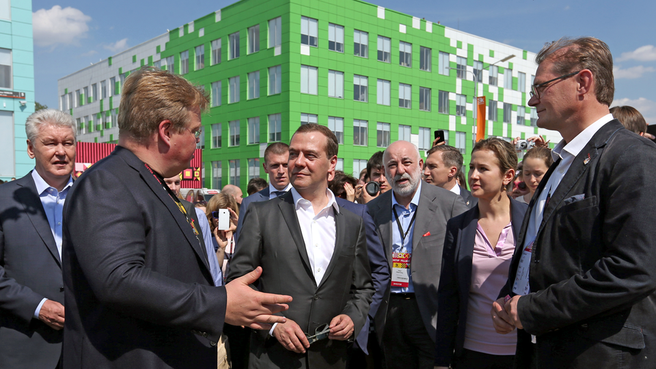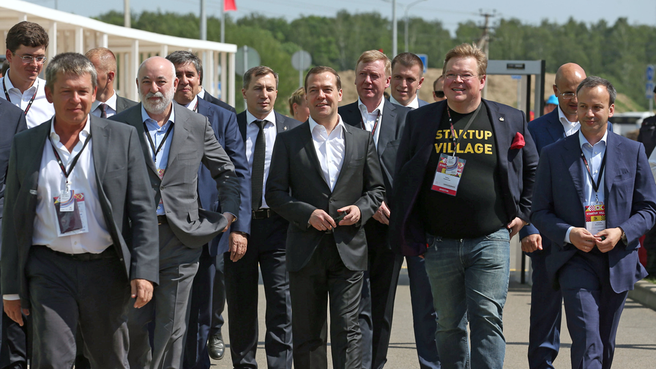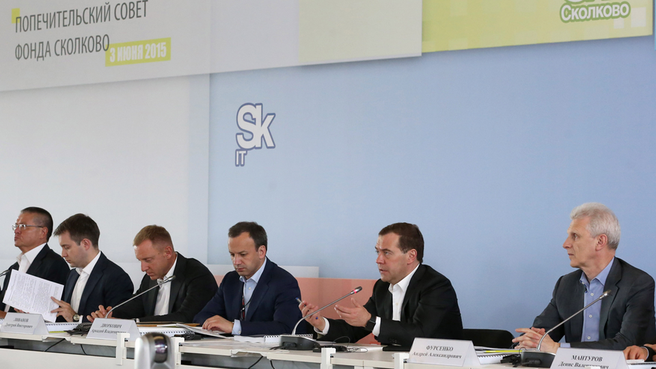Dmitry Medvedev attended the Startup Village international conference and holds a meeting of Skolkovo Foundation Board of Trustees. The Startup Village conference has been organised by the Skolkovo Foundation since 2013. Its primary objective is to give young entrepreneurs an opportunity to collaborate with Russian and international experts, business people and scientists.
International conference Startup Village 2015
Conference participants include start-up companies and teams from Russia, Kazakhstan and Belarus, investors, and representatives from development institutions, major technology corporations and business communities, the media and the student community.
The Startup Village programme includes presentations of over 200 startups at different levels of development, selected in four categories – IT, pure technology, biomedical technology and industrial technology, as well as workshops and seminars for young entrepreneurs. Participants will have an opportunity to speak with potential partners, clients, investors and like-minded individuals.
This year’s Startup Village conference will review the results of the Russian Startup Tour 2015, a roadshow of innovative technology that ran from 3 February to 30 April in Russia, including stops in Kazakhstan and Belarus for the first time ever.
In each city it visits, the Russian Startup Tour seeks to create startup communities of young and talented entrepreneurs and authors of innovative projects, investors, representatives from technoparks, leading regional universities and research centres. Priority areas include IT, space technology, energy efficiency, new materials, nuclear technology, pharmaceuticals and biomedicine.
The Skolkovo Foundation is the principal organiser of the nationwide startup tour. In 2013-2014, 16,000 people visited the event; over 1,300 technological startups passed the preliminary selection and made their presentations; more than 150 of them received various commendations and awards from development institutions. The tour has visited over 60 cities in its first three years.
Dmitry Medvedev’s opening
remarks at a meeting of the Skolkovo Foundation Board of Trustees:
On the whole, the Skolkovo Foundation is working successfully. This is largely due to the efforts of the participants in the project, both Russian and foreign – all those who believed in the project and continue working on it. Despite the rather complicated external backdrop, our strategic guidelines and our partnership with our colleagues have remained unchanged. Obviously, we need a modern, globally integrated system to promote innovations; a system that attracts the best participants, the best developers, the best minds; a system that works through partnership ties and through an active dialogue between all participants – research centres, universities, businesses, innovative companies and individual entrepreneurs.
Currently, 1,100 high-tech companies from 50 regions of our country are Skolkovo residents; approximately 13,500 jobs have been created. The Foundation has expanded the pool of the project’s industrial partners – there are now 60 partners, including recognised global high-tech leaders, such as IBM, Intel, Cisco, SAP, Siemens and Samsung, among others. Russia’s leading manufacturing companies are also represented here – KamAZ, Tatneft, Transmashholding, the Pipe Metallurgical Company and a number of others.
Fifty agreements have been signed to set up research centres, and there is a growing number of accredited investors and deals to promote the Foundation residents’ programmes.
The project has been developing for almost five years. The government has been providing significant support to it. This support has been crucial in getting the project off the ground. Last year, we allocated over 25 billion roubles from the federal budget. This year, significant funds have also been earmarked. At the same time, the centre is actively securing extrabudgetary sources, and the project is already beginning to show results, including financial results.
The most important thing is that the project develops and does not become bureaucratic. This applies to all the sectors that are represented here, all the five clusters, specifically space technology, nuclear technology, energy efficiency, IT and biomedicine. I would like to make special note of the biomedical cluster, the mandate of which now extends to agricultural enterprises and industrial biotechnologies. This is a major independent area that will enable us to use Skolkovo’s potential to develop and promote modern and especially promising agricultural technology and address industrial safety problems.
We proceed based on the premise that it will not be a purely Moscow project, and it is essential to develop relations with the country’s regions. Last year, a Far Eastern division was opened, which will represent the project in the Russian Far East. It is a strategically important region. I am sure that cooperation with Southeast Asian countries will be successful.
The Intellectual Property Centre is working quite effectively. About 5 percent of all of Russia’s international applications for the registration of intellectual property rights under the patent cooperation treaty have been submitted through this centre.
In the current situation, a decision was made to optimise spending for the implementation of a number of projects, including the Skolkovo project. In this context, work with potential investors, private investors who are willing to support the residents’ projects and participate in developing the centre’s infrastructure, is especially relevant.
It is essential not only to effectively organise the work of management bodies, but also work with counteragents and contractors. I am referring to the fact that infrastructure has not been completed. These processes require more thorough oversight to ensure that all construction projects that we have planned for this year are completed this year. Naturally, organisational support will be provided.
As the construction of the main facilities at the innovation centre is completed, it is important to ensure its transport accessibility, primarily its connection to central Moscow.
I hope that the project will not only actively develop – and its development is well in evidence now – but will also play an even more serious role in achieving technological development goals and creating modern production facilities, including those involved in import substitution. To this end, resources should be concentrated to the maximum degree possible, with a special focus on the world’s best approaches and best practices in commercialising research and development.
